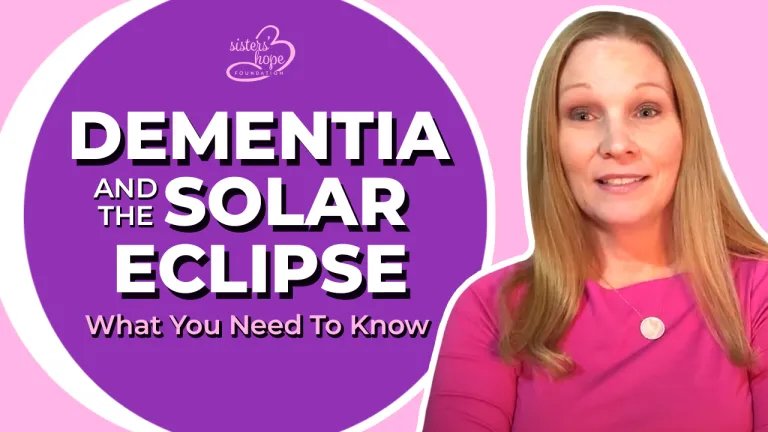Dementia and the Solar Eclipse
Dementia & The Solar Eclipse: What You Need To Know (FULL VIDEO)
Solar Eclipse Resources for People Living with Dementia
The total solar eclipse across the United States will occur on April 8, 2024, and may present unique challenges for people living with dementia. These resources are intended to offer guidance for patients and their care partners.
What is a solar eclipse?
A solar eclipse happens when the Moon passes between the Sun and Earth, casting the Moon’s shadow on Earth.
What happens during a solar eclipse?
The sky will darken during the daytime, and it may get colder outside for about four minutes.
Where will the solar eclipse be visible?
Different parts of the US will experience total darkness while others will experience partial darkness. Kerrville, TX and Erie, PA will experience total darkness for 4 minutes.
It’s important to protect your eyes!
A solar eclipse is exciting, but looking directly at the Sun is dangerous.
Preparing for the solar eclipse
Limit travel, if possible, from Friday, April 4 to Tuesday, April 9, 2024. Expect highways and freeways to be extra busy with thousands of visitors. Here are some steps you can take to avoid traveling these days.
Visit grocery store before or schedule grocery delivery.
Pick up medications before or schedule delivery.
Fill up gas tank.
Avoid scheduling personal appointments during these days.
Check local TV and radio stations for weather, travel and safety reports as eclipse day approaches.
The Solar Eclipse & People Living with Dementia
Dementia is a general term for changes in memory, communication, language, problem-solving, judgement, senses, personality, behavior and mood. These changes can be severe enough to impact a person’s daily life.
Alzheimer’s Disease is the most common cause of dementia, but there are many different types – Lewy Body, Frontotemporal, Vascular, mixed dementia and more. ALSP patients experience dementia and movement problems.
How to Support a Loved One with Dementia During the Total Solar Eclipse
If the person cannot safely watch the total solar eclipse, please consider making their space as comfortable and safe as possible.
Avoid very dark spaces as people living with dementia may fear darkness or become confused if they cannot see well.
Provide soft, indirect light by using translucent light fixtures or coverings to prevent irritating shadows.
Avoid harsh overhead lighting.
Encourage engagement in multisensory activities:
Painting (nails, picture, etc.) while having a conversation. Use pictures or objects in the room as conversation starters.
Drawing or doing a puzzle while listening to their favorite music.
Watching their favorite TV show curled up in their favorite blanket.
Stay as close to their routine as possible to reduce confusion and agitation.

